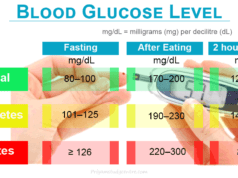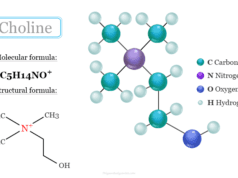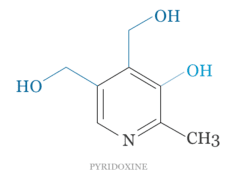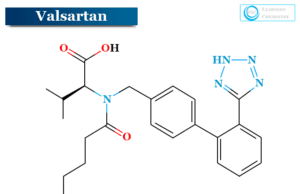Retinol in Vitamin A
Vitamin A referred to a group of organic compounds that includes retinol, retinal, retinoic acid, and several provitamins A carotenoids like beta-carotene. It is an antioxidant that influences growth in animals and increases their resistance to disease by enhancing immune function. The main natural sources are vegetables and animal products but we also use vitamin A supplements to maintain our good health. Vitamin A also beneficial for the treatment of vision problems such as night blindness, Xerophthalmia, and childhood blindness. Night blindness occurs due to vitamin A deficiency in the human diet. A, D, E, and K are fat-soluble but C and B vitamins are water-soluble vitamins. The active form of vitamin A was originally isolated as a yellow oil with high viscosity but later it was obtained as a crystalline solid.
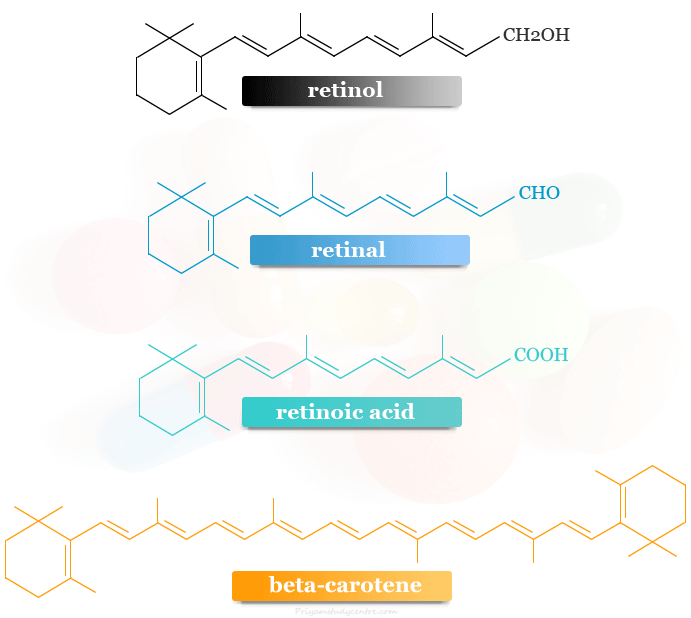
In the vision, retinal1 combines with the protein opsin to form rhodopsin. It is a light-absorbing molecule necessary for low-light and color vision.
Vitamin A deficiency is common in developing countries. Deficiency may occur at any stage of life but is most commonly developed in pre-school-age children and pregnant women. Retinol deficiency in pregnant women occurs due to the transfer of retinol to the fetus.
The transport and storage form of vitamin A is retinol interconvertible with retinal. Retinol is catalyzed to retinal by the enzyme retinol dehydrogenases and back to retinol by retinaldehyde reductases.
retinal + NADPH + H+ ⇌ retinol + NADP+
retinol + NAD+ ⇌ retinal + NADH + H+
Retinoic acid diffuses into the cell nucleus where it regulates the activity of more than 500 genes by binding directly to retinoic acid receptors.
Sources of vitamin A
The primary dietary form of A is retinol which may be attached to fatty acid molecules to form retinyl ester when stored in the liver.
Various forms are found in many natural foods products. The active form of vitamin A (retinol) is found in animal liver, dairy and egg products, and some fortified foods.
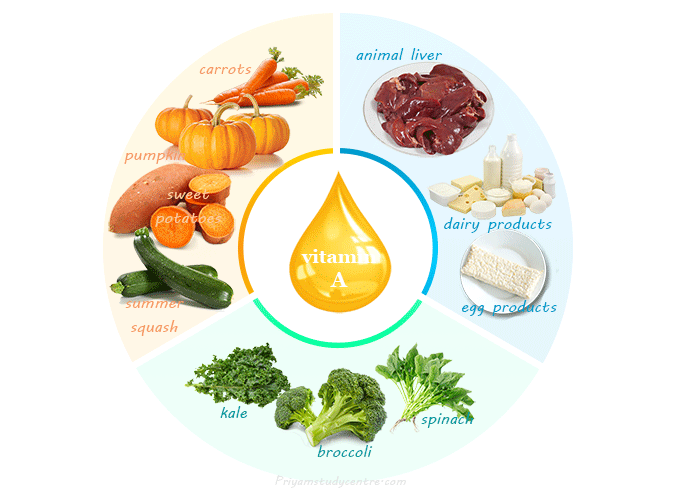
Provitamin A carotenoids are plant pigments digested into vitamin A after consuming carotenoid-rich plant foods. Many fruits and vegetables and some supplements are the reachest sources of beta-carotene, lycopene, lutein, or zeaxanthin.
Natural supplement
Vegetarian and vegan diets can provide sufficient vitamin A in the form of provitamin A carotenoids if the diet contains the following items,
- Leafy green vegetables (kale, spinach, broccoli)
- Orange and yellow vegetables (carrots, sweet potatoes, pumpkin, and other winter squash, summer squash)
Recommended daily intake
It is currently listed on the Nutrition Facts label and measured by international units (IU). The recommended daily intake in mcg at various life stages is given below this table,
| Life stage | Recommended daily intake (mcg) | |
| Infants | 0–6 months | 400 |
| 7–12 months | 500 | |
| Children | 1–3 years | 300 |
| 4–8 years | 400 | |
| Males | 9–13 years | 600 |
| 14–18 years | 900 | |
| 19–70 years | 900 | |
| > 70 years | 900 | |
| Females | 9–13 years | 600 |
| 14–18 years | 700 | |
| 19–70 years | 700 | |
| > 70 years | 700 | |
| Pregnant women | 19–70 years | 770 |
| Breastfeeding women | 19–70 years | 1300 |
Benefits of vitamin A
It serves several important biological functions by helping your body’s natural defense against illness and infection, improving vision in dim light, and keeping skin healthy.
Vitamin A for the immune system
Vitamin A is an anti-inflammation vitamin that plays a critical role in enhancing immune function. It is involved in the development of the immune system and regulates cellular immune responses and humoral immune processes. Hence we use vitamin A for the treatment of various infectious diseases.
Vitamin A refers to retinoids and carotenoids but biological functions in the body occur through the most active form like all trans retinoic acid. It has the highest affinity of the nuclear retinoic acid receptor.
Various studies have shown that the formation of retinoic acid/retinoic acid receptor complex is important to generate immune cell response. In addition to immune cell response, vitamin A also plays an important role in mucus secretion, morphological formation, and epithelial cell maturation.
Vitamin A (retinol) in night vision
Two types of light receptors exist in the retina of the eye:
- Rods: For vision in dim light
- Cones: For vision in bright light and colour vision in humans
Chromoprotein rhodopsin is a highly photosensitive protein complex of retinal1. It accumulates in the rods in the dark. When the retina of our eye is illuminated, the rhodopsin is bleached.
Bleaching occurs by rhodopsin undergoes a series of changes,
- One part of the sequence involves the isomerization of retinal1 into all trans-retinal1.
- In the latter part, which is produced together with the protein opsin in the dissociation of rhodopsin.
Experimental work shows that the 11-cis form of retinal1 is the geometrical isomers of rhodopsin. They isomerized to trans forms when bleaching occurs. The rhodopsin cycle may be represented by the following picture,
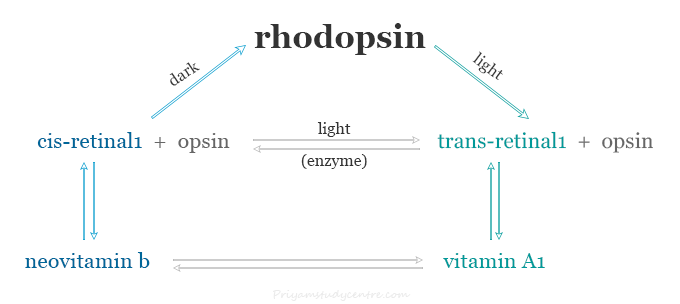
Retinol is the source of all trans-retinal1. Therefore, the deficiency of retinol results in night blindness.
Vitamin A for skin
Some key benefits of vitamin A on our skin may include:
- It has the ability to normalize cell functions. Therefore, it has the ability to influence the cell of our skin to look younger, healthier, and more radiant.
- It helps to improve problematic skin conditions such as acne by leaving skin less oily and more balanced.
- Various forms of vitamin A help to improve the appearance of pigmentation. It normalizes the activity of the enzyme tyrosinase which plays an important role in the production of melanin.
- It helps to speed up healing prevent breakouts and improve the skin’s immune system.
Vitamin A deficiency
Vitamins deficiency is common in various countries from Africa and Southeast Asia. Deficiency may occur at any stage of life but most commonly occur in pre-school-age children, pregnant women, or breastfeeding mothers. Deficiency of vitamin A during pregnancy due to the transfer of retinol to the fetus.
It happens naturally when a low intake of retinol-containing animal foods and a low intake of carotene-containing plant foods. Many children under the age of five years in the world suffer from retinol deficiency. Deficiency may cause preventable childhood blindness.
Signs and symptoms of vitamin A deficiency
Night blindness and dry eyes are the main signs of vitamin A deficiency that can be recognized without any biochemical tests. During diagnosis, plasma retinol tests are used to confirm retinol status.
- A plasma concentration level of about 2.0 μmol/L is normal
- Less than 0.70 μmol/L indicates moderate deficiency
- Less than 0.35 μmol/L suffering from deficiency
The main signs and symptoms of vitamin A deficiency may include:
- Dry Skin: Vitamin A deficiency causes dry skin or skin infection because it is important for the creation of new skin cells and the repair of skin cells.
- Dry eyes: Dry eyes or Xerophthalmia are some of the most common issues caused by vitamin A deficiency.
- Night blindness: Night blindness is one of the most common clinical signs of vitamin A deficiency and it is common during pregnancy.
- Infertility and trouble conceiving: It is an important factor for the reproduction of humans both men and women. It is also needed for proper development in babies.
- Delayed growth in children: Deficiency can affect the proper development of your children because it is necessary for the proper growth of the human body.
- Throat and chest infections: Frequent infections in your throat or chest are a sign of retinol deficiency.
- Poor wound healing: A wound may heal slowly due to a low level of vitamin A.
- Acne and breakouts: It helps in skin development and fights inflammation, hence it may use to treat acne.
Uses of vitamin A
Like other vitamins, it is used to maintain a healthy life. Vitamin A reached food and supplements used mainly for treating skin problems, night blindness, infertility and trouble conceiving, and growth in children.
Use of vitamin A for skin
It is important for the creation of new skin cells and the repair of skin cells. Therefore, not getting enough vitamin A reached foods or supplements may cause the development of eczema and other skin problems.
Eczema is a condition that causes dry, itchy, and inflamed skin. We use vitamin A supplements to treat such skin problems.
Use in night blindness
During night blindness, a person may difficult or impossible to see in relatively low or dim light.
Due to the extent of this problem, health professionals have worked to improve vitamin A levels in people and suggest to use of vitamin A-reached foods or supplements.
Infertility and trouble conceiving
Vitamin A is a part of the reproductive process that helps with the growth of sperm. All-trans retinoic acid (RA) is the active form of this vitamin that supports both male and female reproduction as well as embryonic development.
If you are having trouble getting pregnant, a lack of vitamin A may be one of the reasons.
It is an essential factor for the maintenance of the male genital tract and spermatogenesis. It also participates in a signaling mechanism to initiate meiosis in the female gonad during embryogenesis and the male gonad postnatally.
Growth in children
Vitamin A is an important factor in growth throughout life mainly during childhood. It helps to grow and maintain epithelial tissues that may include mucous membranes, the lining of the gastrointestinal tract, lungs, bladder, urinary tract, vagina, cornea, and skin. It also helps with the growth of bones and teeth.
Vitamin A and pregnancy
It helps the growing tissues in a baby in the womb and also helps the placenta form during pregnancy. Vitamin A helps with the growth of a baby in the womb but high doses of synthetic retinol may lead to problems with growth in the womb.
High levels of retinol-reached foods may cause birth defects during pregnancy. Therefore, if you are pregnant or thinking about having a baby, do not eat liver or liver products because they are very high levels of retinol. Always ask your doctor before taking vitamin A supplements during your pregnancy period.
Vitamin A for acne
According to the American Academy of Dermatology (AAD), vitamin A can help to reduce and prevent inflammatory acne because it has antioxidant and anti-inflammatory properties.
It is beneficial to our skin because it has the ability to decrease inflammation, protect against free radicals, reduce sebum production, and increase skin cell growth. These can reduce the appearance of scars and signs of aging.
Eating foods that have high levels of vitamins effective for our healthy skin. The more popular way to treat acne using vitamin A supplements through topical formulas such as topical creams and serums.

